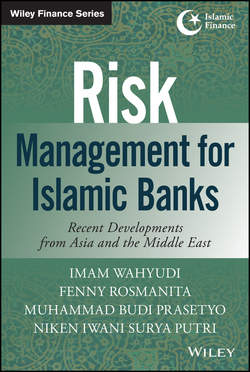Читать книгу Risk Management for Islamic Banks - Imam Wahyudi - Страница 21
На сайте Литреса книга снята с продажи.
Part One
Introduction
Chapter 2
The Islamic Bank and Risk Management
The Importance of Risk Management for an Islamic Bank
ОглавлениеThe urgency in applying risk management in an Islamic bank is to minimize the effects and potential of risk occurrence. Because banks will certainly face risk, what is important is to consider how to minimize its occurrence and effects by managing risks properly. This is also not without its own set of benefits. The first is that, with good risk management, the Islamic bank is then capable of providing information and perspective to management about all risk profiles, about basic changes in products and services offered and changing market conditions, about changes in the business environment, as well as changes that are necessary in the risk management process that will later influence the bank's business decisions. Secondly, with risk management, sources of large problems can be tracked down, easing the formulation of risk management policy as well as how to review risk. Third, risk management also allows the Islamic bank to calculate and measure the size of the risk exposure faced. Fourth, with knowledge about risk exposure, the Islamic bank is expected to be able to determine the allocation of the sources of funds, as well as to measure risk limits more accurately. Fifth, with better risk management, the Islamic bank is able to avoid an overly concentrated investment portfolio. Sixth, without risk management, it will be difficult to estimate the amount of reserve necessary to anticipate the occurrence of the most probable risks according to the risk calculation and measurement that has been done. Seventh, by minimizing risks, the Islamic bank is able to avoid even larger potential losses.
Other than the importance of risk management for the Islamic bank itself, other stakeholders also have some hopes and expectations on the bank's application of good risk management. The central bank or the related regulator overseeing the banking industry in each country of course expects all banks under its supervision to be prudent and healthy banks, able to generate a real contribution to the nation's economy. For the customers, the Islamic bank that is able to manage its risks well will be able to provide the optimum service as well as the best rate of return. The customer will trust the Islamic bank as an institution that is trustworthy (amanah) in managing the investment that they planted, and trust is the most important capital for a bank to have to guarantee its continued survival. For investors as stock owners, other than receiving a satisfying rate of return, they also require adequate information. This will be used as a basis to consider investments, and because of this, transparent information, including the bank's own transparency efforts and risk profile, is an absolute necessity for the Islamic bank. Stockholders also expect the Islamic bank as a place of investment will always be of going concern, has a stable profit as well as providing added value to society, one of which is blessings to society. For the business partners of the Islamic bank, like suppliers, providers, agency, and other parties, they expect that the Islamic bank in question will become a trustworthy bank, with a good image and reputation, and will enter into good and mutually beneficial cooperation.
Конец ознакомительного фрагмента. Купить книгу
